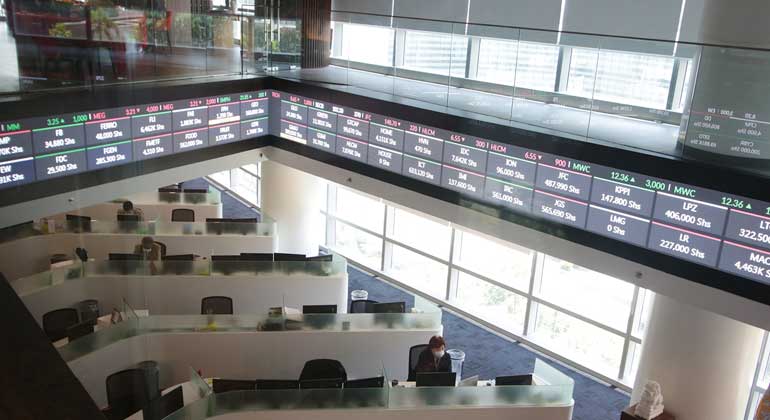
By Denise A. Valdez, Senior Reporter
EARNINGS of blue-chip stocks may fall deeper this year as third-quarter earnings results came in weaker than expected due to quarantine measures meant to contain a coronavirus pandemic.
The reporting season for corporate earnings ended last week, and the 30 members of the Philippine Stock Exchange index (PSEi) posted an aggregate profit decline of 38% in the third quarter, based on data from Philippine National Bank (PNB).
This was better than the previous quarter’s 59% year-on-year drop, but resulted in a 52% slump in earnings for the nine months through September.
“Although the slower decline in the third quarter was expected, the magnitude of the improvement was lower than our expectations,” PNB Vice-President and Head of Equity Research Alvin Joseph A. Arogo said in a Nov. 20 e-mail to BusinessWorld.
The lender’s full-year forecast was a 34% year-on-year decline for the aggregate earnings of PSEi members.
“This will be revised down given that the total nine-month decline was 52% year on year,” Mr. Arogo said. “Earnings growth in the fourth quarter is unlikely given the slower-than- expected recovery in the economy.”
Philippine economic output fell by 11.5% in the third quarter, resulting in a year-to-date contraction of 10%.
Earnings weakened in the third quarter after the capital region and nearby provinces reverted to a stricter lockdown after a fresh surge in infections in August, breaking the recovery momentum.
Government spending growth also slowed to 5.8% last quarter from 21.8% in the second quarter, Mr. Arogo said.
Some sectors managed to perform better or on par with expectations, Christopher John Mangun, research head at AAA Southeast Equities, Inc. said in an e-mailed reply to questions.
“Bank earnings came in better than expected as revenues are at their highs,” he said. “The reduction in net income was only due to added buffers for potential bad loans.”
Mr. Mangun also said property earnings were 50-70% lower year on year, but almost double the level in the previous quarter.
He now expects full-year earnings to slump by 50-60% from a year earlier, with fourth- quarter earnings improving by as much as 40% from the previous quarter.
“The PSEi is currently up 22% since the beginning of the fourth quarter, recovering all its losses from the drop that we saw back in March,” Mr. Mangun said. “We may see it climb further towards the end of the year.”
Mr. Arogo expects corporate earnings to start posting growth next year as the economy recovers from the crisis.
“Key factors that will drive earnings growth next year are containment of new virus cases, which would allow consumers and businesses to spend even without a vaccine, as well as timely and meaningful government spending,” he added.
Among PSEi members, those that will drive recovery next year are companies that made the biggest adjustments to new trends, such as going online and improving logistics, Mr. Mangun said.
Companies in the retail and manufacturing sectors might continue to lag, along with those that rely heavily on exports, he added.
“Our economy is consumer-based,” Mr. Mangun said. “We need to see a pickup in spending from consumers as well as the government, which is highly possible as consumers gain confidence that the risks of the pandemic are gone and it is OK to spend again.”
He expects government spending to pick up next year after the national budget was increased to P4.5 trillion to fund more infrastructure projects and boost state response to the pandemic.
The PSEi closed at 7,169.79 on Friday, its highest finish since February after gaining 2.46% or 172.17 points from the previous session.
